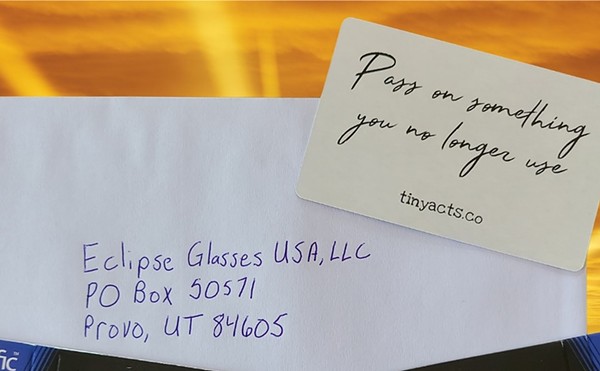Allan Henry wants to put a biodiesel refinery in the West End. Specifically, he wants U.S. Farmers Bio-Industries, the Dry Ridge, Ky.-based company where he’s vice president of sales, to inhabit the old Anderson Packaging facility at 1400 Southwestern Parkway, between Chickasaw Park and the Metropolitan Sewer District’s Morris Forman wastewater treatment plant. On a warm, sunny day like last Friday, the area is picturesque, like a post-industrial Bob Ross oil painting.

The thing with pictures is that they engage only one sense.
Despite the visual serenity that part of Louisville offers, the air is fetid and stagnant, not the overpowering stink of, say, the Swift plant in Butchertown, but enough to prompt you to switch your car’s ventilation system to “circulate” when you drive through.
That, in a nutshell, is why many neighborhood residents oppose the company’s proposal to turn the former packaging plant into a refinery for biodiesel, an environmentally friendly diesel fuel additive that, in this case, would be made primarily from poultry fat.
But that’s not the only reason. The company ignored its would-be neighbors from the beginning, according to several people involved.
In two public meetings meant to allow the company talk with West End residents — the meetings are a required first step in obtaining the conditional use permit the company is currently seeking from the Louisville Metro Board of Zoning Adjustment — U.S. Farmers reportedly failed to provide adequate answers to pressing questions about emissions, odor controls and the use of methanol, a highly flammable chemical compound central to the refining process, among others.
Four people attended the first meeting, on Nov. 11. Turnout for the second meeting, on Nov. 30, increased more than tenfold. It was the first time the community at-large learned details of the project.
“There were a lot of questions left unanswered,” said Leslie Barras, associate director of River Fields, a Louisville-based environmental organization.
Between the flurry of e-mails and the flood of criticism at the second public meeting, neighbors have made their position clear. And provoking a community primed by years of fighting for cleaner air — the recent implementation of the STAR program is the paramount victory — is like running into a nest of cubs to get away from a bear, a mix of blind desperation and sheer miscalculation that only compounds the problem.
“I think they have begun to see at least a glitter of hope,” Arnita Gadson, director of the West Jefferson County Task Force and environmental justice coordinator for U of L, said of some neighborhood residents. “And to have another company come in that is at this point a minor emitter, who has already stated they have hopes to grow, which means they would eventually become a major emitter simply because of size, is more than the community is willing to deal with.”
But Henry tells a completely different story. In an interview Monday, the blunt and plainspoken VP said members of Greater Louisville Inc., the city’s chamber of commerce/economic development arm, assured him that neighborhood residents would support the facility. But, he said, after community sentiment became clear at the second public meeting, city officials turned their backs on the company.
“From that day forward, the city has not returned calls, avoids us like the plague,” he said.
Carmen Hickerson, GLI’s vice president of public relations, declined to get into details during an interview Monday, saying simply, “We disagree with that statement.”
Henry also accused city officials of causing “mass hysteria” by spreading half-truths about the facility and its potentially damaging effects on air quality. He claims to have recorded proof of city officials offering inducements — a five-year moratorium on taxes and around $500,000 in tax incentives — and lending general support for the company and facility. Asked to provide that proof to LEO, he declined, saying it was in his attorney’s possession.
The company is still “assessing our options” of whether to continue to fight for the $3 million site, which Henry said it has already purchased.
Hickerson said a lot of “misinformation” has been swirling about the involvement of GLI, which is not technically a part of Metro government but handles the city’s economic development. GLI does not, for instance, have jurisdiction in the permitting process.
She said that for the last year or so, GLI has been helping U.S. Farmers locate in Louisville — showing real estate, apprising the company of the permitting processes and so on. GLI showed the company more than 50 properties across the city, she said, although the one U.S. Farmers eventually chose wasn’t on the GLI list.
As it stands now, the matter of emissions is hazy. Last Monday the company was scheduled for a public hearing before BOZA, which will consider whether to grant U.S. Farmers a conditional use permit for the site. (Such permits allow for zoning exceptions.) The land in question is now zoned EZ-1, an enterprise zone that is also home to Marathon/Ashland Oil storage tankers.
Conditional use permits create a domino effect behind the scenes, said Steve Hendrix, the BOZA planning coordinator handling this project. To grant the permit, other government agencies — Air Pollution Control District, Metropolitan Sewer District, local and state transportation agencies, the fire department and the office of Inspections, Licenses and Permits — must first be consulted.
But according to APCD, U.S. Farmers has not provided the city agency with adequate information for its air permit application, although the company has already filed that paperwork.
“The simple answer is that we’re waiting for them,” said Matt Stull of APCD. “We don’t have everything we need from them to make an informed opinion, and until we have that, we’re not going to say one way or the other what the effect of this plant is.”
Again, Henry gives a contradictory account.
“I don’t feel they need any more information,” he said. The air permit application was filed with APCD on Dec. 7.
Tom Fitzgerald, director of the Kentucky Resources Council, has examined the air permit application.
“At this point in time, given what I know and in no small part given what I’ve not been able to find out about the process they’re going to use, the lack of experience in this company using this product, and the location, the KRC doesn’t support BOZA issuing a conditional use permit,” he said.
Sarah Lynn Cunningham, a licensed professional engineer advising the KRC, collaborated with Fitzgerald on a list of 18 questions the KRC sent last week to the company’s lawyer concerning emissions data.
“I would have to say the application is too ill-defined, and in places undefined, for me to make an assessment,” she said in an interview last week. Cunningham said she’d “love to see our society have a good way to solve our chicken fat problem and reduce our dependence on petroleum-based automobile fuels,” but so far she’s unconvinced this facility would be a viable operation.
The facility is also near a residential area, which presents more potential problems. Before coming to Louisville, U.S. Farmers wanted to locate a refinery in Kenton County, Ky. Last February, however, Kenton County Fiscal Court opted not to change the zoning in the area where such a facility would go because of its proximity to residences.
At press time, the BOZA public hearing had not been rescheduled. It was not clear when — or if — BOZA would resume consideration of a conditional use permit for the facility.
Contact the writer at [email protected]





